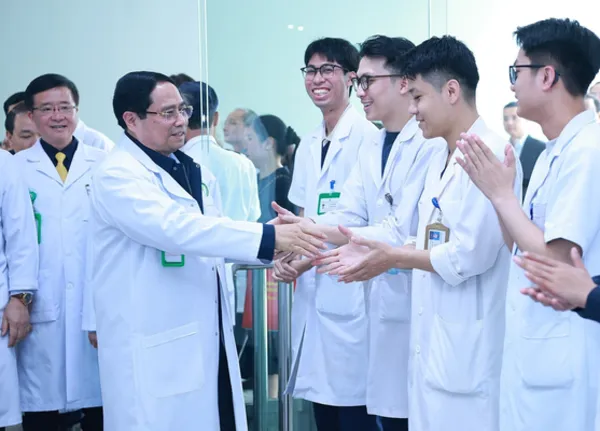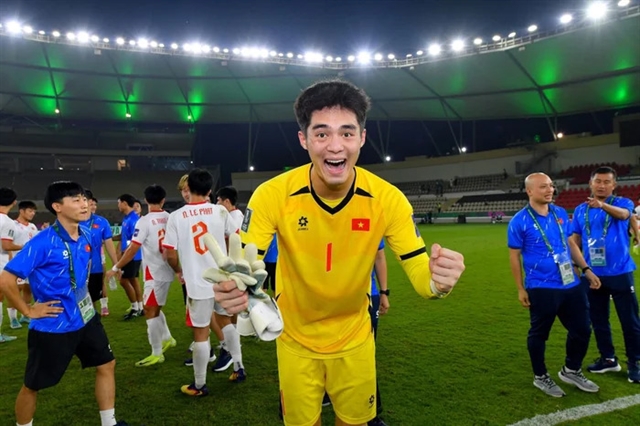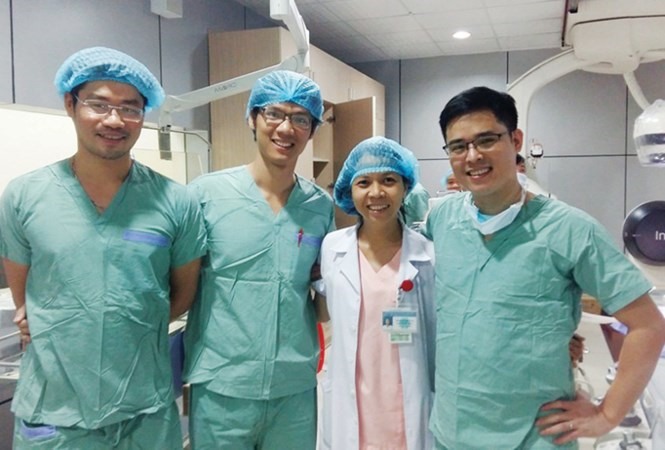 Society
Society

“It has been five years since our surgery, but I feel like it was recent. I remember the day when I was hospitalized. You, with your loving thick glasses, were the first person I met. And during my days of treatment, you always encouraged my mother and me. You bring hope to me and others and help sick hearts.”
 |
| Doctor Đại (first right) and his colleagues pose for a photo after he demonstrated a technique of innate heart disease surgery. — Photo tienphong.vn |
by Thái Hà
HÀ NỘI — “It has been five years since our surgery, but I feel like it was recent. I remember the day when I was hospitalized. You, with your loving thick glasses, were the first person I met. And during my days of treatment, you always encouraged my mother and me. You bring hope to me and others and help sick hearts.”
This is one part of a letter, among a number of letters from young patients to their loving doctor – Trần Đắc Đại, head of the Children’s Heart Ward under the E Hospital in Hà Nội.
Many of the letters have spelling mistakes, but all of them are full of emotion and love for the doctor, who clearly plays the extra role of the children’s fairy godmother.
Children’s angel
Đại’s Facebook page is full of hundreds of messages of gratitude from patients and their families. With the messages are photographs of children with beautiful smiles proving the marvelous thing that Đại has brought to their families. To them, Đại is an angel wearing a white blouse.
The children suffering from innate heart diseases may not have had the opportunity to write such thankful sayings if an unexpected incident had not happened several years ago.
When he was a student, Đại was never interested in becoming a doctor. He dreamt of becoming an agronomist.
At the university entrance exam, Đại, who came from the northern province of Bắc Ninh’s Quế Võ District, was accepted by all four universities. He chose the Hải Phòng Medical University, following advice from his relatives.
Đại did not have any passion during his two first years at the university.
In his third year, during a period gaining practical experience at the Hải Phòng Paediatrics Hospital, Đại witnessed a boy suffering from serious diarrhoea and subsequently dying. The boy’s image made Đại lose sleep all night, as the boy was as small as Đại’s nephew. Since then, Đại determined to become a passionate doctor to help limit loss of life.
After finishing his five years at the university, Đại continued to study three more years to become a resident physician.
Once when Đại was in his practical period at the National Paediatrics Hospital, the hospital received 28 patients in serious condition, but had only two doctors and six nurses. The hospital lost electricity one day, and some of the 28 patients were in critical condition, so doctors and nurses had to continuously give them manual ventilation.
Đại remembered that at that time he was very afraid—afraid that he could not fulfill the work and that the children might die. But three years of studying as a resident physician helped Đại become a doctor with a strong spirit, able to handle serious cases.
Passion
Đại remembers deeply the moment that he gave himself a heart ultrasound to distinguish a healthy heart from his pediatric patients’ sick hearts.
Đại has often bought pigs’ hearts to give them ultrasounds, looking for the similarities and differences with human hearts.
After receiving the resident physician degree, Đại received a scholarship to study for a year in France, learning about innate heart diseases.
 |
| Doctor Đại gives heart ultrasound to a baby. — Photo tienphong.vn |
Speaking about Đại, associate professor Hiếu cannot hide his pride.
“The day I met him for the first time was a special day. A baby cried loudly before the surgery, and Đại, very gentle, made the baby smile after only some minutes. I immediately realised that Đại was born to do the work, which is miserably hard and difficult,” said Hiếu.
Đại understands well the knowledge that associate professor Hiếu taught him, and became Hiếu’s honest colleague.
“Đại does well the work that I dream of doing but have not done, such as taking care of the children with innate heart diseases from the time they are in the womb until after they are born,” said Hiếu.
“With Đại, I believe in a bright future for Việt Nam’s innate heart sector,” he said.
Đại said that his biggest motivation is seeing the patients’ smiles after they recover. Đại has tried his best to keep little angels alive, and he seems to be born to revive small hearts. — VNS